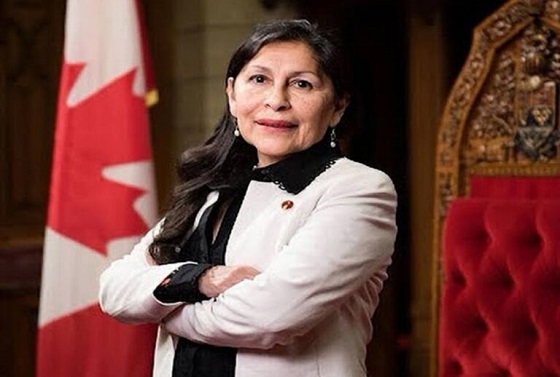Energy
Canadian natural resource minister’s wife invests in oil stocks as gov’t attacks industry

From LifeSiteNews
Records show Tara Wilkinson’s stock purchases include ‘fossil fuel’ producers targeted for eventual elimination by the Liberal government.
The wife of Canadian Natural Resources Minister Jonathan Wilkinson bought oil and gas company stocks, records show, at the same time the federal Liberal government has been attacking the industry in a bid to curb so-called “fossil fuel” use and “fight against climate change.”
According to records as per a recent Blacklock’s Reporter report, Wilkinson’s wife, Tara, amped up her trading in oil and gas stocks last year in Enbridge Incorporated and Shell PLC. The records were found filings under Canada’s Conflict of Interest Code for Members of the House of Commons.
Records show Mrs. Wilkinson also has shares in the globalists linked BlackRock Inc., Amazon, and Finning International Inc., the military-industrial complex linked to Lockheed Martin Corporation, along with COVID jab promoting Pfizer and 3M Company. She also holds stock in Royal Bank and Toronto Dominion Bank.
As early as December, Wilkinson boasted that “Canada became the first oil and gas producer in the world to put a cap on oil and gas emissions.”
He also has claimed that he is looking out for his family’s future by promoting federal climate programs.
Indeed, in 2021, he said he would “honour the commitments we made to our children that we’re going to leave them something that is a workable and sustainable world,” claiming “climate change” is the “existential issue of our time.”
He also claimed, despite his wife and by extension family profiting off oil and gas companies, that “we are on a trajectory to reducing to net zero by 2050” and that “it is important in our fight against climate change.”
Other current and former Liberal cabinet ministers also have oil and gas stocks, such as former Addictions Minister Carolyn Bennett, former Attorney General David Lametti and current Veterans Affairs Minister Ginette Petitpas Taylor.
Oil and gas companies have been racking in high profits due to both a high demand for oil and gas and higher oil prices.
The federal government under Prime Minister Justin Trudeau since 2015 has pushed a radical environmental agenda similar to the agendas being pushed the World Economic Forum’s “Great Reset” and the United Nations “Sustainable Development Goals.”
Late last year, the Trudeau government forged ahead with many policies that if they come to full fruition will destroy Canada’s oil and gas industry, which provides jobs to thousands and is important in Alberta and Saskatchewan.
At COP28 held late last year, Environment Minister Steven Guilbeault unveiled a plan to slash oil and gas emissions by 35% to 38% below 2019 levels. He claimed that it is important to reach “carbon neutrality in Canada by 2050.”
At COP28, he announced a new Liberal federal government climate policy that aims to incentivize beef cattle ranchers to reduce how much gas their cows emit by giving them feed additives.
A recent near power blackout in Alberta due to the failure of wind and solar power, however, highlights how so-called sustainable wind and solar power, which the Trudeau government heavily promotes, are not a good fit for Canada’s cold climate.
Alberta Premier Danielle Smith has blasted Guilbeault as a “menace” for going after her province and the oil and gas industry in general and vowed to fight him with every tool available to her government.
The Trudeau government has also pledged to mandate that all new cars and trucks by 2035 be electric, which would in effect ban the sale of new gasoline- or diesel-only powered vehicles after that year.
The reduction and eventual elimination of the use of so-called “fossil fuels” and a transition to unreliable “green” energy has also been pushed by the World Economic Forum (WEF) – the globalist group behind the socialist “Great Reset” agenda – an organization in which Trudeau and some of his cabinet are involved.
A June 2017 peer-reviewed study by two scientists and a veteran statistician confirmed that most of the recent global warming data have been “fabricated by climate scientists to make it look more frightening.”
There have been two recent court rulings that have dealt a blow to Trudeau’s environmental laws, however.
The most recent was the Federal Court of Canada on November 16 overturned the Trudeau government’s ban on single-use plastic, calling it “unreasonable and unconstitutional.”
The second ruling comes after Canada’s Supreme Court recently sided in favor of provincial autonomy when it comes to natural resources. The Supreme Court recently ruled that Trudeau’s law, C-69, dubbed the “no-more pipelines” bill, is “mostly unconstitutional.” This was a huge win for Alberta and Saskatchewan, which challenged the law in court. The decision returned authority over the pipelines to provincial governments, meaning oil and gas projects headed up by the provinces should be allowed to proceed without federal intrusion.
The Trudeau government, however, seems insistent on defying the recent rulings by pushing forward with its various regulations.
Energy
Mistakes and misinformation by experts cloud discussions on energy

From the Fraser Institute
By Jason Clemens and Elmira Aliakbari
The new agreement (MOU) between the Carney and Alberta governments sets the foundation for a pipeline from Alberta to the British Columbia coast, at least conceptually. Unfortunately, many politicians and commentators, including the bureau chiefs for the Globe and Mail and Toronto Star, continue to get many energy facts wrong, which impairs the discussions of how best the country can and should move forward to capitalize on our natural resources.
For example, commentors often wrongly describe the tanker ban on the west coast (C-48) as a general ban on oil tankers. But in reality, the law only applies to tankers docking at Canadian ports. It does not and cannot prevent tankers from travelling the west coast so long as they’re not stationing at Canadian ports. This explains the continued oil tanker traffic in the northwest region for tankers docking in U.S. ports in Alaska. Simply put, there is not a general tanker ban on the west coast.
Commentators also continue to misrepresent the current capacity on the expanded Trans Mountain pipeline (TMX). According to the Canada Energy Regulator (CER), the average utilization of the TMX since it came online in June 2024 is 82 per cent (reaching as high as 89 per cent in March 2025). So, while there’s some room for additional oil transportation via TMX, it’s nowhere close to the “doubling” being discussed in central Canada. Critically, though, according to the CER, from “June 2024 to June 2025, committed capacity was effectively fully utilized each month, averaging 99% utilization.”
Similarly, there’s a misunderstanding by many in central Canada regarding the potential restart of the Keystone XL pipeline, which apparently President Trump is keen on. Keystone would not diversify Canada’s exports because while oil does make its way down to the southern U.S. where it can be exported, the actual sale of Canadian oil is to U.S. refineries, so our reliance on the U.S. as our near-sole export market would continue unless a west and/or east coast pipeline is developed.
There also continues to be an artificial and costly connection made between Ottawa removing the arbitrary emissions cap on greenhouse gases by the oil and gas sector and the approval of a new pipeline with the proposed Pathways carbon capture project, which is a collaboration between five of Canada’s largest oil producers. This connection was galvanized in the MOU.
The idea behind the project is to reduce (conceptually) the amount of greenhouse gas (GHG) emitted from oil extraction and transportation projects linked with Pathways. The Pathways project produces no economic value or product—it simply collects and stores GHG emissions—and reports suggest the total cost for the first phase of the project will reach $16.5 billion.
Should Canadians care about adding costs related to GHG mitigation? There are several factors to consider. First, Canada is already a low-GHG emitting producer of oil. According to the Carney government’s first budget (page 105, chart 1.5 which ranks the world’s 20 top oil producers based on their GHG emissions per unit of output), Canada already ranks 7th-lowest in terms of emissions. And more importantly, it’s lower than every country—Venezuela, Russia, Iraq and Mexico—that produces a similar type of oil as Canada. Any resources spent further reducing GHG emissions via carbon capture will result in small incremental gains contrasted with large costs (again, at least $16.5 billion). A number of analysts have already raised concerns about the investment and competitiveness implications of increasing the cost structures for Alberta producers.
Second, according to the federal government, in 2022 Canada produced 1.4 per cent of global GHG emissions, and the oil and gas sector produced roughly one-quarter of those emissions. In other words, if Canada eliminated all GHG emissions from the oil sector via carbon capture, the process would consume vast amounts of scarce resources (i.e. money) and result in a nearly undetectable change in global GHG emissions. One can only conclude that this is much more about international virtue-signalling than the actual economics and environmental implications of Canada’s potential energy projects.
At a time when Canada is struggling with crisis levels of private business investment, falling living standards and as the Bank of Canada described, a break-the-glass crisis in productivity growth, it’s clearly not wise to spend tens of billions of dollars on projects that might make politicians and bureaucrats feel better and enable them to use near Orwellian language like “zero-emissions oil” but that actually deliver almost no detectable environmental benefits.
To borrow our prime minister’s favourite phrase, kickstarting Canada’s oil and gas sector is the easiest way to catalyze economic growth given our vast energy reserves, know-how in the sector, and high productivity. To do so, we need a national dialogue rooted in facts.
Energy
Ottawa and Alberta’s “MOU” a step in the right direction—but energy sector still faces high costs and weakened competitiveness

From the Fraser Institute
By Tegan Hill and Elmira Aliakbari
The Memorandum of Understanding (MOU) between Alberta Premier Danielle Smith and Prime Minister Mark Carney, which includes a new oil pipeline to BC’s northwest coast, offers some hope for Canada’s energy future. While this agreement is a step in the right direction, it puts Alberta’s energy sector on the hook to secure access to new markets while facing higher costs and reduced competitiveness.
Earlier this year, Smith demanded then-newly elected Prime Minister Carney repeal nine “bad laws” stifling oil and gas investment, which has collapsed by nearly 61 per cent in the province since 2014, falling from $64.7 billion to $25.4 billion in 2024 (inflation-adjusted).
One key policy on the list was the proposed federal emissions cap, which would have applied exclusively to the oil and gas sector. According to the MOU, Canada will not move forward with the cap, which is a welcome change. Indeed, multiple analyses showed that the cap would have inevitably resulted in a production cut, costing the economy billions and resulting in tens of thousands of job losses. And, with oil and gas demand continuing to climb, the cap would have shifted production to other countries with lower environmental and human rights standards such as Iran, Russia and Venezuela.
Scrapping the Clean Electricity Regulations (CER) was also one of Smith’s demands. While the MOU states that “Canada and Alberta remain committed to achieving net zero greenhouse gas emissions by 2050”, the CER as it applies to the province will be suspended for the time being. Again, this is a critical and positive change for a province where 85 per cent of its electricity comes from fossil fuels—a larger share than nearly any other province. (For perspective, in Quebec, over 85 per cent of its electricity comes from hydro.) The Alberta Electric System Operator (AESO) estimates it would cost $44 to $54 billion to decarbonize Alberta’s grid by 2041—a 30 to 36 per cent spending increase—costs that ultimately fall on consumers.
A third key policy on Smith’s list of nine bad laws was repealing Bill C-48, which banned large oil tankers off BC’s northern coast from docking in Canadian ports. According to the MOU, there may be a limited exemption to the ban. Specifically, it states that to enable the export of bitumen there may be an “appropriate adjustment.” The law effectively prevents Canadian producers from accessing Asia and other international markets. Crucially, the legislation applies only to tankers docking in Canadian ports—U.S. and foreign tankers continue to operate freely in the same waters accessing U.S. ports. In other words, the law exclusively hinders Canada’s competitiveness—creating a carve out for one pipeline will not fix this problem.
All of these policy changes or exemptions are conditional on stronger industrial carbon pricing and support for the massive multibillion-dollar Pathways project–a 400-kilometer pipeline transporting carbon trapped at oil facilities to an underground storage facility near Cold lake Alberta and led by a group of Canada’s five largest oil companies. Earlier this year, Alberta froze its industrial carbon tax at $95 per tonne through 2026, but the MOU states that the system will ramp up to a minimum price of $130/tonne. This will increase the cost of producing, processing and transporting oil, at a time when a surge in global oil production and downward pressure on oil prices is expected. Ultimately, this will widen the competitiveness gap between Alberta and many other jurisdictions, such as the United States, that do not have comparable carbon pricing in place.
The agreement is also conditional on the $16.5 billion (minimum estimate) Pathways project to capture, sequester and store carbon underground. Adding carbon capture technology would increase production costs by roughly US $1.2-$3 per barrel for oil sands mining operations and US $3.6-$4.8 for oil sands facilities that use steam. These higher costs further erode the province’s competitiveness and won’t help in attracting private sector investment.
The memorandum of understanding makes some important strides for Canada’s energy future and is certainly an improvement on the status quo, but it still leaves Alberta’s energy sector facing higher costs and weakened competitiveness, and more broadly doesn’t remove the many impediments to large-scale development of our oil sector.
-

 Business2 days ago
Business2 days agoBlacked-Out Democracy: The Stellantis Deal Ottawa Won’t Show Its Own MPs
-

 Agriculture2 days ago
Agriculture2 days agoHealth Canada pauses plan to sell unlabeled cloned meat
-

 Crime1 day ago
Crime1 day agoB.C.’s First Money-Laundering Sentence in a Decade Exposes Gaps in Global Hub for Chinese Drug Cash
-

 Crime2 days ago
Crime2 days agoFBI Seizes $13-Million Mercedes Unicorn From Ryan Wedding’s Narco Network
-

 Banks1 day ago
Banks1 day agoThe Bill Designed to Kill Canada’s Fossil Fuel Sector
-

 International2 days ago
International2 days agoAmerica first at the national parks: Trump hits Canadians and other foreign visitors with $100 fee
-

 armed forces1 day ago
armed forces1 day ago2025 Federal Budget: Veterans Are Bleeding for This Budget
-

 Business2 days ago
Business2 days agoFederal major projects list raises questions








